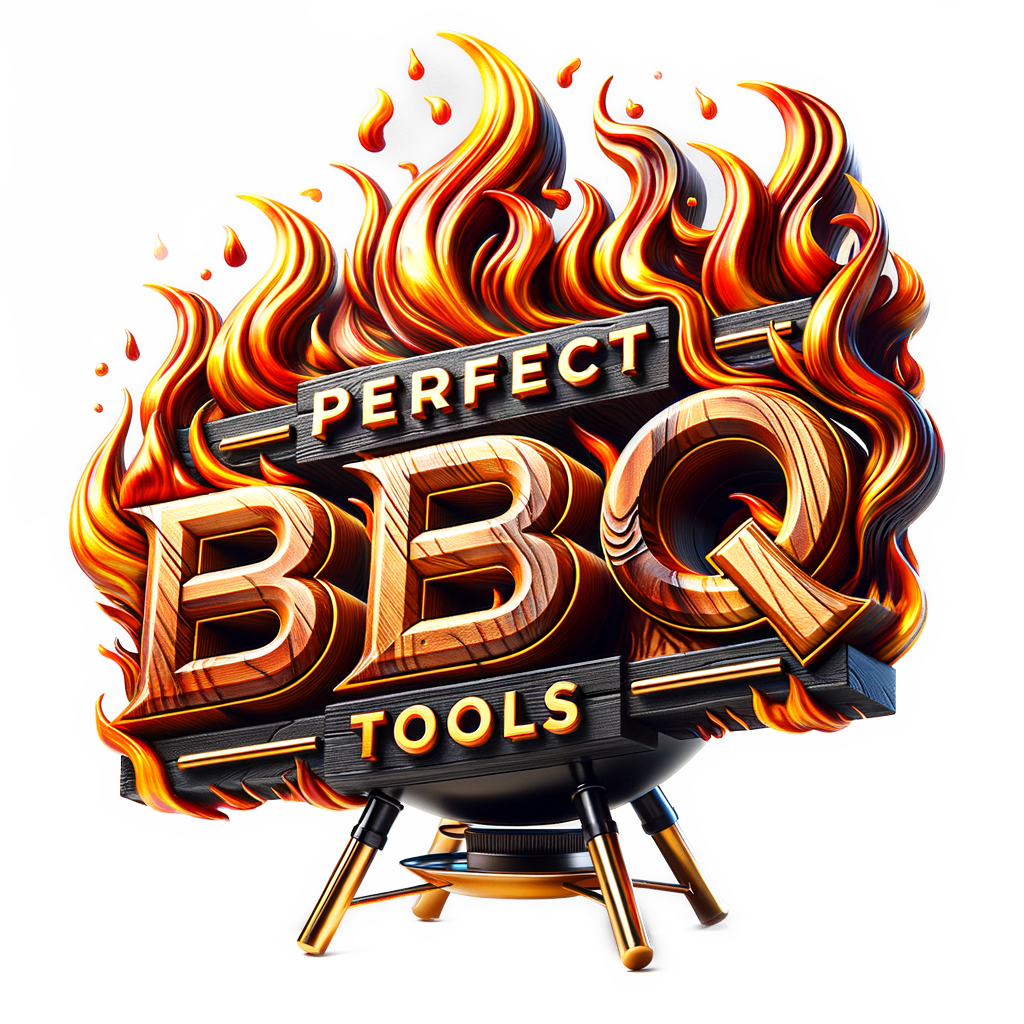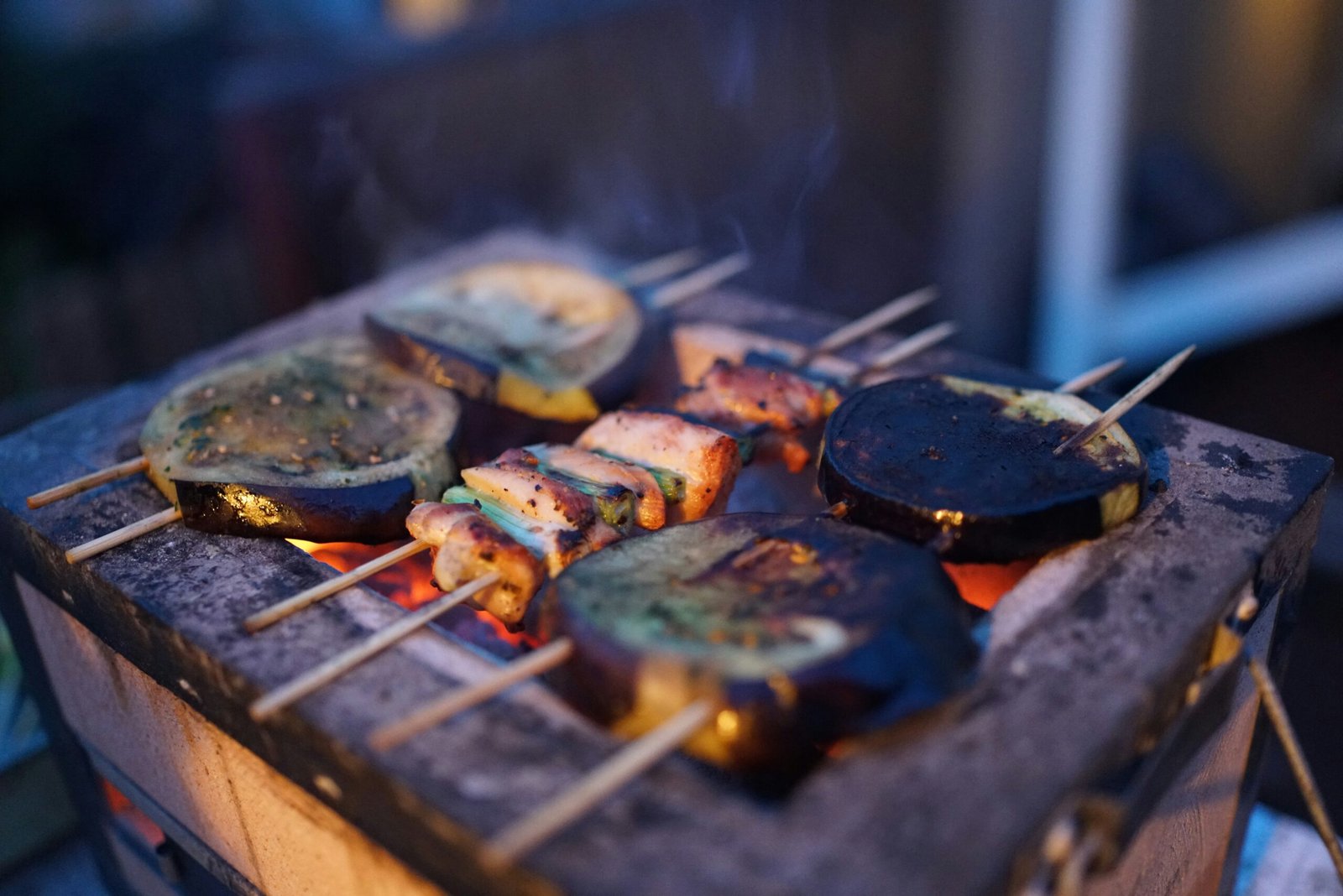If you’ve ever found yourself standing in front of a sizzling grill, pondering whether or not skewers are necessary for grilling kebabs, you’re not alone. The age-old question of skewer or no skewer has puzzled many home cooks and grill enthusiasts alike. In this article, we’ll explore the pros and cons of using skewers for grilling kebabs, and ultimately help you decide if they’re an essential tool for your next grilling adventure. So, grab your apron and let’s dive into the world of kebab grilling!
Understanding the Concept of Kebabs
Definition of kebabs
Kebabs are a popular and versatile dish that consists of various pieces of meat, seafood, or vegetables skewered and grilled to perfection. The ingredients are typically marinated in a flavorful mixture of herbs, spices, and sauces before being threaded onto skewers. The skewers not only hold the ingredients together but also allow for easy handling and even cooking.
History and origin of kebabs
The origins of kebabs can be traced back to ancient times, with various cultures and countries claiming their own versions of this delicious dish. It is believed that the kebab originated in the Middle East, specifically in Persia (modern-day Iran). The Persian word “kabāb” translates to “roasted meat,” which reflects the traditional method of cooking kebabs over an open fire.
Over time, kebabs spread to different parts of the world, influenced by the trade routes and cultural exchanges. In the Mediterranean region, countries like Greece and Turkey developed their own unique variations of kebabs, incorporating local flavors and ingredients. Today, kebabs are enjoyed globally and have been adapted to suit different culinary traditions.
Different types of kebabs around the world
Kebabs come in various forms, each with its distinct style and taste. Some popular types of kebabs include:
- Shish Kebab: Originating from Turkey, this kebab typically consists of marinated cubes of meat threaded onto skewers, often with vegetables like peppers and onions.
- Seekh Kebab: Commonly found in Indian cuisine, this kebab features spicy ground meat, typically lamb, shaped onto skewers and cooked over high heat.
- Doner Kebab: Hailing from the Middle East, this kebab is made by stacking thin slices of marinated meat onto a vertical rotisserie, allowing the meat to cook slowly and become tender.
- Satay: Popular in Southeast Asia, particularly in Indonesia and Malaysia, satay is made by skewering small pieces of marinated meat, such as chicken or beef, and grilling them over an open flame. It is often served with a peanut sauce for dipping.
These examples merely scratch the surface of the diverse range of kebabs found around the world. The unique combination of spices, meats, and cooking techniques in each region leads to a wide array of flavors and textures to explore.
The Role of Skewers in Kebab Preparation
What skewers are
Skewers are long, slender rods made from different materials such as metal or wood, specifically designed for threading pieces of food for grilling or roasting. They play a vital role in the preparation and cooking of kebabs, as they hold the ingredients securely in place while ensuring even heat distribution and easy handling.
Why skewers are used for kebabs
Skewers are an essential tool for making kebabs due to several reasons. Firstly, they provide stability to the ingredients, preventing them from falling apart or slipping into the grill. This is particularly important when grilling smaller or irregularly shaped items such as cubed meat, shrimp, or vegetables.
Secondly, skewers allow for efficient cooking by ensuring an even distribution of heat. When the ingredients are arranged closely on a skewer, they create a compact and cohesive unit, allowing the heat from the grill to penetrate each piece evenly. This results in a uniform and thoroughly cooked kebab.
How skewers aid in grilling kebabs
Skewers facilitate the grilling process by making it easier to maneuver the kebabs on the grill. Whether using a gas or charcoal grill, the long handle of the skewers provides a comfortable grip, allowing you to position the kebabs precisely and adjust their distance from the heat source as needed. In addition, the elevated nature of the skewers prevents direct contact between the ingredients and the grill grates, reducing the risk of sticking or burning.
Skewers also allow for convenient flipping of the kebabs during cooking. By rotating the skewers, you can ensure that all sides of the ingredients are evenly exposed to the grill’s heat, resulting in a beautifully charred exterior and juicy interior. This simple technique helps achieve that sought-after smoky flavor and enhances the overall enjoyment of the kebabs.
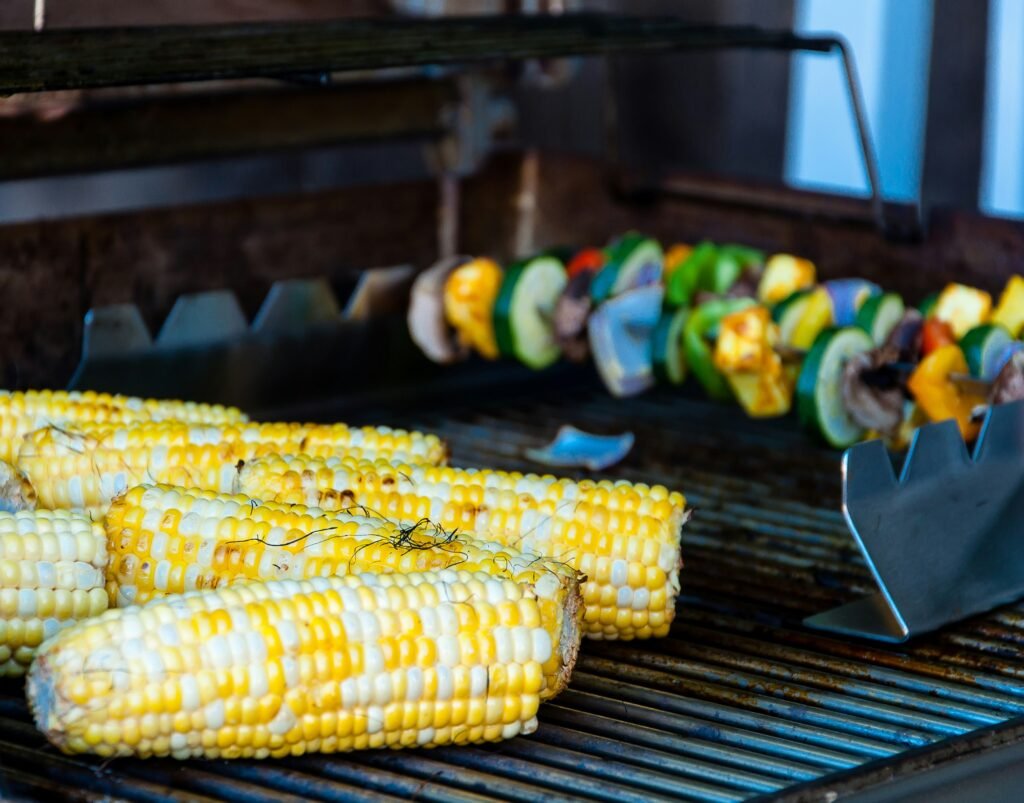
Types of Skewers for Grilling Kebabs
Metal skewers
Metal skewers, usually made of stainless steel, are a popular and durable option for grilling kebabs. They are strong, long-lasting, and resistant to heat, making them ideal for high-temperature cooking. Metal skewers often have pointed ends, which allow for easy threading of ingredients without tearing or breaking them.
One advantage of using metal skewers is their ability to conduct heat efficiently. This ensures that the ingredients cook uniformly and quickly, resulting in well-cooked and flavorful kebabs. Metal skewers are also easy to clean, as they can be washed in the dishwasher or by hand.
Bamboo skewers
Bamboo skewers are a budget-friendly and disposable option for grilling kebabs. They are typically made from natural bamboo fibers and come in a variety of lengths, making them suitable for different sizes of kebabs.
Bamboo skewers need to be soaked in water before using them for grilling. This step prevents them from burning or charring excessively during the cooking process. While bamboo skewers may not have the longevity of metal skewers, they are an eco-friendly choice due to their biodegradable nature.
Stainless steel skewers
Stainless steel skewers combine the durability of metal skewers with the flexibility of bamboo skewers. They are reusable and easy to clean, making them a popular choice among grilling enthusiasts. Stainless steel skewers often feature a flat or twisted design, which helps prevent the ingredients from rotating during cooking.
Due to their stainless steel construction, these skewers are rust-resistant and can withstand intense and prolonged heat exposure. They are also available in various lengths to accommodate different grilling needs.
Flat skewers
Flat skewers, also known as sword skewers, offer a unique design and functionality compared to traditional round skewers. These skewers have a wide, flat surface, which prevents the ingredients from spinning or slipping during grilling. The flat shape also promotes even heat distribution, resulting in consistent cooking.
Flat skewers are typically made of stainless steel or metal and can be either reusable or disposable. They are particularly useful for delicate ingredients that require gentle handling and secure attachment.
Disposable skewers
Disposable skewers, made from materials such as bamboo or wood, are a convenient option for casual grilling occasions. They eliminate the need for cleaning and storage, as they can be discarded after use. Disposable skewers are widely available and come in various lengths and thicknesses.
While disposable skewers may not have the same durability as their reusable counterparts, they are an excellent choice when hosting large gatherings or outdoor events where convenience is key. They are also a suitable option for those who prefer a hassle-free grilling experience.
Considerations when choosing Skewers
Size of the skewer
When selecting skewers for grilling kebabs, it is important to consider the size of the skewer relative to the ingredients. Skewers that are too short may not provide enough space for proper threading or cooking, while excessively long skewers may be challenging to maneuver on the grill.
Ideally, the skewer length should be slightly longer than the size of your grill grates to allow for easy placement, flipping, and removal of the kebabs. It’s also essential to choose a thickness that can handle the weight and size of the ingredients without bending or breaking.
Material of the skewer
The choice of skewer material can have an impact on the cooking process and overall grilling experience. Metal skewers, such as stainless steel, offer durability and heat conductivity, ensuring efficient and even cooking. However, they can become hot to the touch, requiring caution when handling.
Bamboo or wood skewers are a good option for those seeking an environmentally friendly and disposable choice. They are easy to use and dispose of, eliminating the need for cleaning and storage. However, they may require soaking prior to grilling to prevent charring or burning.
Reusable vs. Disposable skewers
Deciding between reusable and disposable skewers depends on personal preference, convenience, and environmental considerations. Reusable skewers, such as metal or stainless steel, are cost-effective in the long run and offer durability and versatility. They can be used repeatedly, provided they are properly cleaned and stored after each use.
Disposable skewers, on the other hand, offer convenience and simplicity. They are a perfect choice for occasions where time and ease of cleanup are crucial. It is important to consider the environmental impact of disposable skewers and opt for sustainable options whenever possible.
Cost of skewers
The cost of skewers varies depending on the material, quality, and brand. Metal or stainless steel skewers may have a higher upfront cost but can be a worthwhile investment for frequent grillers due to their long-lasting nature. Disposable skewers tend to be more affordable and are often sold in larger quantities.
Consider your grilling habits, frequency, and budget when deciding on the type of skewers to purchase. It may be beneficial to invest in a set of reusable skewers for regular use and keep a pack of disposable skewers as a backup or for larger gatherings.
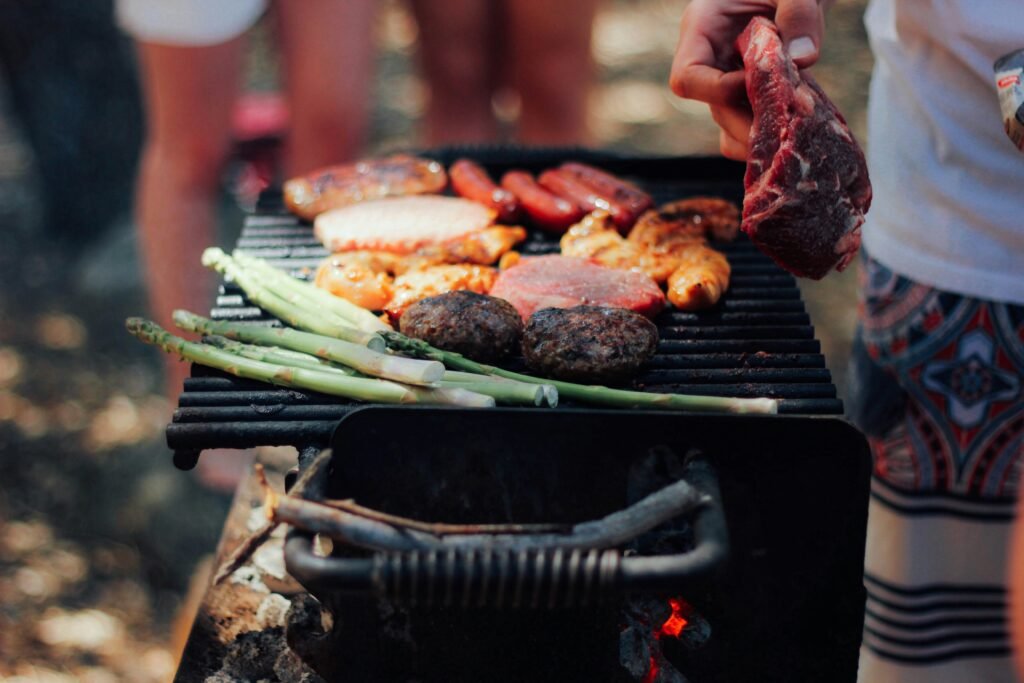
Alternative Ways of Grilling Kebabs without Skewers
Using a grill basket
If you don’t have skewers or prefer a different cooking method, a grill basket can be an excellent alternative for grilling kebabs. A grill basket is a metal basket with small holes or slits that allow for indirect grilling of small, delicate ingredients.
To use a grill basket, simply place the marinated kebab ingredients inside the basket, ensuring that they are evenly spread out to promote even cooking. Place the basket on the grill, allowing the heat to cook the ingredients through the perforated surface. This method is particularly useful for grilling vegetables, seafood, or smaller cuts of meat that may be challenging to skewer.
Layering on a grill rack
Another alternative to using skewers is layering the ingredients directly on a grill rack. This method works well for ingredients that are less likely to fall apart or slip through the grill grates.
To grill kebabs without skewers using this method, arrange the marinated ingredients in a single layer directly on the grill grates. Make sure to leave enough space between each piece to ensure even cooking. You may need to flip the pieces individually to cook them evenly on both sides. This method allows for greater contact with the grill grates, resulting in enhanced smoky flavors and charred marks.
Foil method
If you prefer a more contained and hands-free approach to grilling kebabs, the foil method can be a suitable option. This method involves wrapping the marinated ingredients tightly in aluminum foil packets, which will then be placed on the grill.
To use the foil method, divide the ingredients into individual portions and form them into compact and sealed foil packets. Ensure that the packets are well-sealed to trap the heat and moisture, creating a mini-oven effect. Place the foil packets directly on the grill and allow them to cook over indirect heat. This method is great for steaming the ingredients, resulting in juicy and flavorful kebabs.
Benefits of Grilling Kebabs with Skewers
Ensures even cooking
Using skewers for grilling kebabs helps ensure even cooking throughout the ingredients. By threading the pieces closely together on the skewer, they create a compact unit that allows the heat to distribute evenly. This prevents some pieces from being undercooked while others are overcooked, resulting in a harmonious blend of flavors and textures.
Easier to manage on the grill
Skewers provide a convenient way to handle and manage the kebabs on the grill. The long handle of the skewer allows for precise placement, flipping, and removal of the kebabs without getting too close to the heat source. This makes it easier to control the cooking process and prevent any mishaps or accidents.
Makes serving easy and convenient
Grilling kebabs with skewers makes serving a breeze. Once the kebabs are cooked, they can be presented directly on the skewers, creating an attractive and appetizing display. The skewers act as handles, allowing guests to pick up their kebabs without getting their hands messy. This eliminates the need for additional utensils or plates, making it a convenient and enjoyable dining experience.
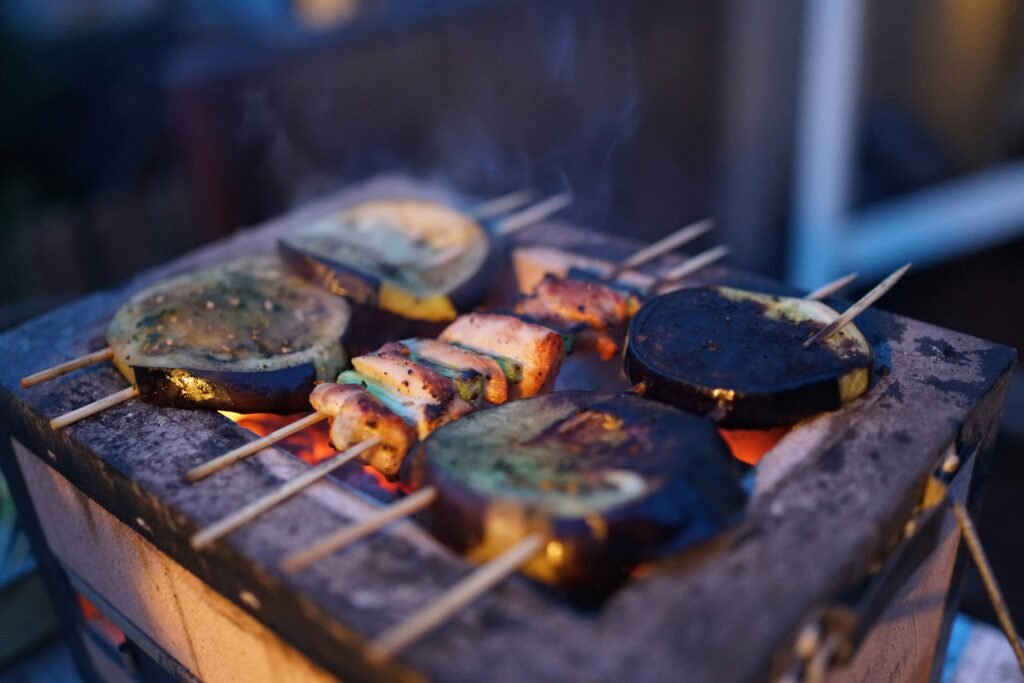
Disadvantages of Grilling Kebabs without Skewers
Risk of uneven cooking
When grilling kebabs without skewers, there is a higher risk of uneven cooking. As the ingredients are not secured or arranged closely together, some pieces may cook faster than others, leading to an inconsistent result. This can result in some pieces being undercooked while others are overcooked or burnt.
Increased chances of food falling off the grill
Without skewers to hold the ingredients securely in place, there is a greater risk of food falling through the grill grates. This is particularly true for smaller or irregularly shaped ingredients like diced vegetables or seafood. The lack of stability can make it challenging to achieve the desired level of doneness without losing some of the ingredients to the flames.
More difficult to serve
Grilling kebabs without skewers can make serving a bit more challenging. Without a handle or cohesive unit to hold onto, the individual pieces of kebab may be more difficult to serve or transfer onto plates. This can lead to a messier serving experience and an increased likelihood of ingredients falling apart during the process.
Health Aspects of Cooking Kebabs with Skewers
Safety of different types of skewers
The safety of skewers depends on the material and how they are handled during the cooking process. Stainless steel skewers are generally safe to use, as they are heat-resistant and do not emit any harmful substances when exposed to high temperatures. It is important to handle metal skewers with oven mitts or tongs to prevent burns.
Bamboo and wood skewers can also be safe to use, provided they are properly soaked in water before grilling. Soaking the skewers helps prevent them from catching fire or burning excessively. It’s important to monitor the skewers closely while grilling to ensure that they do not become charred or pose a safety hazard.
How skewers prevent overcooking
Skewers aid in preventing overcooking of kebabs by promoting even heat distribution. When the ingredients are threaded closely together on the skewer, they create a barrier that prevents excessive direct contact with the grill’s heat source. This allows for more controlled and gradual cooking, reducing the risk of overcooking or drying out the kebabs.
Hygiene in using reusable skewers
When using reusable skewers, it is essential to maintain proper hygiene practices to prevent foodborne illnesses. Before and after each use, thoroughly clean the skewers using hot, soapy water or the dishwasher to remove any food residue or bacteria. Ensure that the skewers are completely dry before storing them to prevent the growth of mold or rust.
It is also important to handle the skewers with clean hands and avoid cross-contamination by keeping raw and cooked ingredients separate. Regularly inspect the skewers for any signs of damage, such as bent or loose ends, and replace them as needed to ensure safe and hygienic grilling.
Method of Skewering Kebabs for Grilling
How to arrange ingredients on the skewer
When skewering kebab ingredients, it is essential to consider their size and shape to ensure even cooking. Start by selecting ingredients that can be cut into uniform pieces, such as cubes or similar sizes. This will help prevent some pieces from cooking faster than others.
Begin by threading larger or sturdier ingredients, such as meat or dense vegetables, onto the skewer first. This provides a solid base and helps anchor the smaller or more delicate ingredients. Alternate between different ingredients to create a varied and visually appealing presentation. Make sure to leave a small gap at the end of the skewer for easy handling during grilling.
Spacing between ingredients
When arranging the ingredients on the skewer, it is important to leave a small gap between them. This allows for even heat distribution and thorough cooking. Aim for approximately 1/4 to 1/2 inch of space between each piece, depending on their size and density. Avoid overcrowding the skewer, as this can lead to uneven cooking and potential food safety concerns.
Preventing ingredients from falling off
To prevent ingredients from falling off the skewer during grilling, ensure that they are threaded securely and tightly onto the skewer. Start by securing larger or denser pieces at the base of the skewer to create stability. If using smaller or irregularly shaped ingredients, consider layering them between larger pieces or using additional ingredients as “bookends” to hold them in place.
It can also be helpful to slightly angle the skewer when threading the ingredients, piercing them closer to the center to provide better grip. As a precaution, avoid overloading the skewer with too many ingredients, as this can increase the risk of them sliding or falling off during cooking.
Maintenance and Care for Skewers
Cleaning instructions for skewers
Proper cleaning of skewers is essential to ensure their longevity and maintain hygiene. After each use, remove any remaining food particles by scrubbing the skewers with a brush or sponge under hot, soapy water. Pay special attention to any stuck-on residue or charred bits.
For metal or stainless steel skewers, they can often be cleaned in the dishwasher for added convenience. However, it is always recommended to check the manufacturer’s guidelines to ensure the skewers are dishwasher-safe.
For bamboo or wood skewers, avoid soaking them in water or using harsh detergents. Instead, rinse them thoroughly under running water, making sure to remove any visible debris. Allow them to air dry completely before storage.
Correct storage of skewers
To prolong the lifespan of your skewers, it is important to store them properly. Metal or stainless steel skewers can be stored in a kitchen drawer, utensil holder, or hung on a hook for easy access. It is recommended to keep them away from excessive moisture, which could lead to rust or corrosion.
Bamboo or wood skewers should be stored in a dry location to prevent mold or mildew growth. It is best to store them upright in a container or in the original packaging, ensuring proper ventilation to prevent moisture buildup.
When to replace skewers
Skewers may eventually show signs of wear and tear, warranting replacement. Metal or stainless steel skewers should be replaced if they become severely bent, corroded, or have loose or damaged ends. Such damage can compromise the skewer’s structural integrity and safety during grilling.
Bamboo or wood skewers may need replacement if they become splintered, cracked, or excessively charred. Inspect them before each use and discard any skewers that appear compromised or unsafe.
Regularly assess the condition of your skewers to ensure they are in good working order. Replacing worn or damaged skewers will not only maintain optimal grilling results but also enhance the safety and enjoyment of your kebab cooking adventures.
In conclusion, skewers play a crucial role in the preparation, grilling, and enjoyment of kebabs. They provide stability, even heat distribution, and ease of handling. From the traditional metal skewers to the disposable bamboo options, there are various types to suit different preferences and grilling needs. While alternative methods can be employed for grilling kebabs without skewers, they may come with some disadvantages, such as inconsistent cooking or difficulty in serving. Skewers also offer hygiene benefits by preventing overcooking and facilitating safe handling and serving. By understanding the different types of skewers, their maintenance requirements, and considering personal preferences and cooking habits, you can choose the most suitable option for your grilling adventures. So gather your ingredients, fire up the grill, and get ready to enjoy delicious and perfectly cooked kebabs on skewers!
